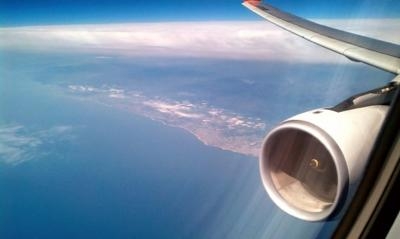Wed, Nov 07, 2012
ESA Claims New Alloy Cuts Weight By Half Without Sacrificing Safety
ESA research has helped to develop an aircraft-grade alloy that is twice as light as conventional nickel superalloys that the agency says offers equally good properties.

The path to creating this alloy required research under all types of gravity. Airlines are always looking for ways to save fuel by cutting down on weight without sacrificing safety. Generally, cutting weight by 1% will save up to 1.5% in fuel. For commercial airlines, this saving quickly adds up, offering cheaper flights and fewer stopovers while reducing the overall impact on the environment.
Since the newer alloy can withstand extreme temperatures up to 800°C, it is of particular interest to engine manufacturers. For years, engineers have known that titanium aluminide alloys offer great weight benefits over the nickel superalloys used today in conventional jet engines.
Although it is possible to make the alloy in a laboratory, casting it in the shapes required by industry, such as a turbine blade, is not simple. ESA scientists working in the Impress project looked into the problem. To understand natural processes, scientists often remove as many external variables as possible, concentrating their observations on core interactions.
The Impress project needed to ‘switch-off’ a factor that hampers observations: gravity. Aluminium samples were heated in a small furnace carried in a sounding rocket launched from Kiruna, Sweden. During six minutes of free fall, they were heated to over 700°C and then monitored by X-rays as they cooled. Looking at the results, the researchers realised that casting titanium aluminides might require looking in the opposite direction: hypergravity.
ESA is the only organization that offers all levels of gravity, so the Impress team turned to the agency’s centrifuge in the ESTEC research and technology centre, the Netherlands to test their theory. Casting the metals in a centrifuge creating up to 20 times normal gravity helps the liquid metals to fill every part of a mold, producing a perfectly cast alloy, even with complex shapes. Analyzing metal casting in as many ways as possible produced building blocks of knowledge that allowed the industrial process to be refined and commercialised.
Over a million jet turbine blades will be made over the next eight years, and using titanium aluminide would reduce their weight by 45% over traditional components. The alloy’s benefits are also of interest to the car industry – before long, cars will run on engines using space-based knowledge.
(Image provided by ESA)
More News
Airbus Racer Demonstrator Makes Inaugural Flight Airbus Helicopters' ambitious Racer demonstrator has achieved its inaugural flight as part of the Clean Sky 2 initiative, a corners>[...]
A little Bit Quieter, Said Testers, But in the End it's Still a DA40 Diamond Aircraft recently completed a little pilot project with Lufthansa Aviation Training, putting a pair of >[...]
Line Up And Wait (LUAW) Used by ATC to inform a pilot to taxi onto the departure runway to line up and wait. It is not authorization for takeoff. It is used when takeoff clearance >[...]
Contributing To The Accident Was The Pilot’s Use Of Methamphetamine... Analysis: The pilot departed on a local flight to perform low-altitude maneuvers in a nearby desert val>[...]
From 2015 (YouTube Version): Overcoming Obstacles To Achieve Their Dreams… At EAA AirVenture 2015, FedEx arrived with one of their Airbus freight-hauling aircraft and placed>[...]
 Airbus Racer Helicopter Demonstrator First Flight Part of Clean Sky 2 Initiative
Airbus Racer Helicopter Demonstrator First Flight Part of Clean Sky 2 Initiative Diamond's Electric DA40 Finds Fans at Dübendorf
Diamond's Electric DA40 Finds Fans at Dübendorf ANN's Daily Aero-Term (04.23.24): Line Up And Wait (LUAW)
ANN's Daily Aero-Term (04.23.24): Line Up And Wait (LUAW) NTSB Final Report: Extra Flugzeugbau GMBH EA300/L
NTSB Final Report: Extra Flugzeugbau GMBH EA300/L Classic Aero-TV: 'Never Give Up' - Advice From Two of FedEx's Female Captains
Classic Aero-TV: 'Never Give Up' - Advice From Two of FedEx's Female Captains



